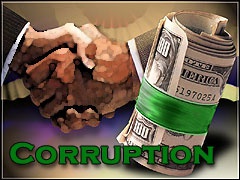CNN) -- Industrialized countries have been enabling corruption in Africa by providing crooked officials with a haven for their money, according to Nobel economics laureate Joseph Stiglitz.
The former World Bank chief economist, one of the few economists to foresee the global financial crisis, was among the speakers at this year's Global Poverty Summit, held in Johannesburg.
Speaking to CNN's Robyn Curnow, Stiglitz expressed optimism about Africa's economic prospects, but he said there should be more discussion about undisclosed bank accounts in the West that are used to facilitate high-level fraud in Africa.
"The advanced industrial countries have some responsibility," said Stiglitz. "One of the things that's on a standard form is for corrupt dictators to steal money and put it in a bank account in an advanced industrial country.
"There's been a lot of discussion in the G-20 about secret bank accounts as tax agents -- there hasn't been enough discussion of secret bank accounts as corruption facilitators."
Stiglitz said corruption could be reduced by increasing scrutiny of corrupt governments, using mechanisms such as freedom of information acts and a free press.
But he added that the West also had a role to play.
"One of the countries that hosted the G-20 and talked all the time about tax corruption, that same country is a haven for corrupt money and refuses to repatriate money that has been stolen from Africa," he said.
"Now, this seems to me something that ought to be on the agenda. There's a relationship, there are people making money off of it, and we ought to stop that.
"We shouldn't enable that corruption and we're doing that in the West when we allow them to have their secret bank accounts."
Stiglitz added that there was reason for optimism about economic growth in Africa, with changes to economic policies in recent years starting to bear fruit.
"There is an enormous amount of dynamism in Africa, so I think it's a moment of real opportunity," he said.
But he stressed the need for Africa to reverse what he called its "process of de-industrialization over the last 25 years."
"One of the things that Africa has to do is realize it cannot just be a source of natural resources, that it has to start industrializing, producing agriculture services -- it's not just the old industry," he said. "I think it's actually a very good time. Wages are rising in Asia and people are asking, 'Where can we start producing in a competitive way?' I think Africa provides an example of one of the important areas."
General News of Wednesday, 9 February 2011
Source: CNN
West 'facilitates corruption in Africa' says top economist

















